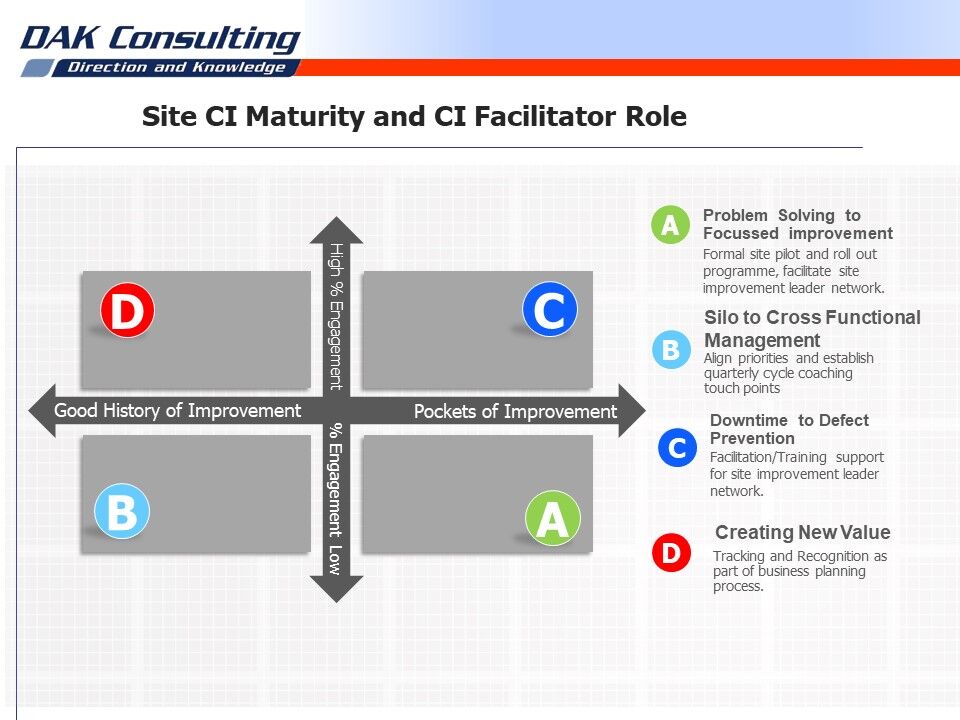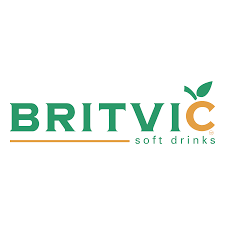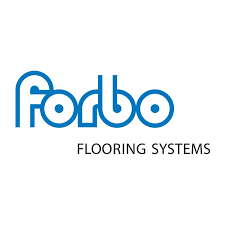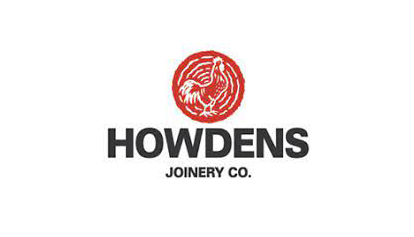
- Details
- Category: Blog
Understanding the Improvement Journey
As organisations improve performance, the nature of the improvement journey changes.
For example, as organisations develop the ability to reduce unplanned stops, the role of those involved in shop floor leadership, planning and engineering activities changes from dealing with day to day issues to refining how the operations runs.
As organisations make progress on their improvement journey, Improvement Leader capabilities need to remain at least one step ahead of the needs of the organisation so that they are able to put in place a process for those in key roles to develop:
- New skill sets
- Leadership Capabilities
- Workforce Engagement
- Self managed teamwork
The matrix below (Figure1), based on our research into the improvement journeys of award winning and well respected organisations, plots the characteristics of improvement support against level of workforce engagement and improvement history.
Organisations at each part of the Matrix require a different set of CI Facilitator support capabilities. CI Facilitation for Organisations at:
- Involves the creation of centres of excellence to engage front line personnel in systematic improvement and release management and technical time from management firefighting.
- Involves working with functional teams to align priorities and resource allocations to raise standards.
- Involves developing capabilities to reduce unplanned interventions and improve process precision to reduce defects, improve resilience and enhance customer value,
- Involves facilitation across commercial, operations and technology functional boundaries to set the future customer agenda.

Figure 1: Site Improvement Glide Path Status and CI Facilitator Capabilities
Developing Home Grown CI Facilitators
The role of CI Facilitators is to support the engagement all personnel in the systematic delivery of Continuous Improvement goals as a core business activity. That includes the design and delivery of improvement programmes capable of achieving business and personnel development goals for:
- Senior teams
- Functional teams
- Value stream cross functional teams
- Asset/task level teams
To do that they need to develop their understanding of:
- Improvement frameworks such as Lean, TPM and Six Sigma to surface improvements
- Change management processes to establish new practices and lock in the gains
- Leadership/behavioural modelling processes to drive engagement and proactive improvement
As organisations make progress on their improvement journey, CI Facilitators capabilities need to remain at least one step ahead of the needs of the organisation. In addition:
- The CI Facilitator role is often used as part of the development pathway for future leaders.
- As engagement increases a ratio of around 1 CI facilitator to every 60 -100 employees is necessary to sustain momentum.
That involves developing internal CI Facilitator capabilities through core (can support), intermediate (can lead) and specialist (Can coach others) levels of competence covering
Workstream 1 Programme Planning, Organisation and Governance
This workstream covers facilitating actions to:
- Agree local area targets and plans to deliver them
- Identify and influence resources to support delivery of the agreed plan
Workstream 2: Application of CI Toolsets to Deliver Business Gains
This workstream involves facilitating actions to:
- Develop agreed cross functional improvement priorities.
- Set, monitor and guide progress along the agreed improvement glide path
- Deliver changes needed to lock in improvement gains.
Workstream 3: Change Management
This workstream involves facilitating actions to:
- Maintaining momentum through the CI maturity index milestones
- Promote the development of capabilities to achieve the site vision.
Workstream 4: Leadership Development and Workforce Engagement
This workstream involves facilitating actions to:
- Support cross department/functional teamwork
- Promote a positive attitude to improvement as a personal development pathway
DAK Coaching plans are developed to meet individual requirements and can include
- Train the trainer support for DAK Academy courses
- Video material to support the facilitation role
- Face to face or remote coaching to support workplace project activities.
Contact us for more details.








